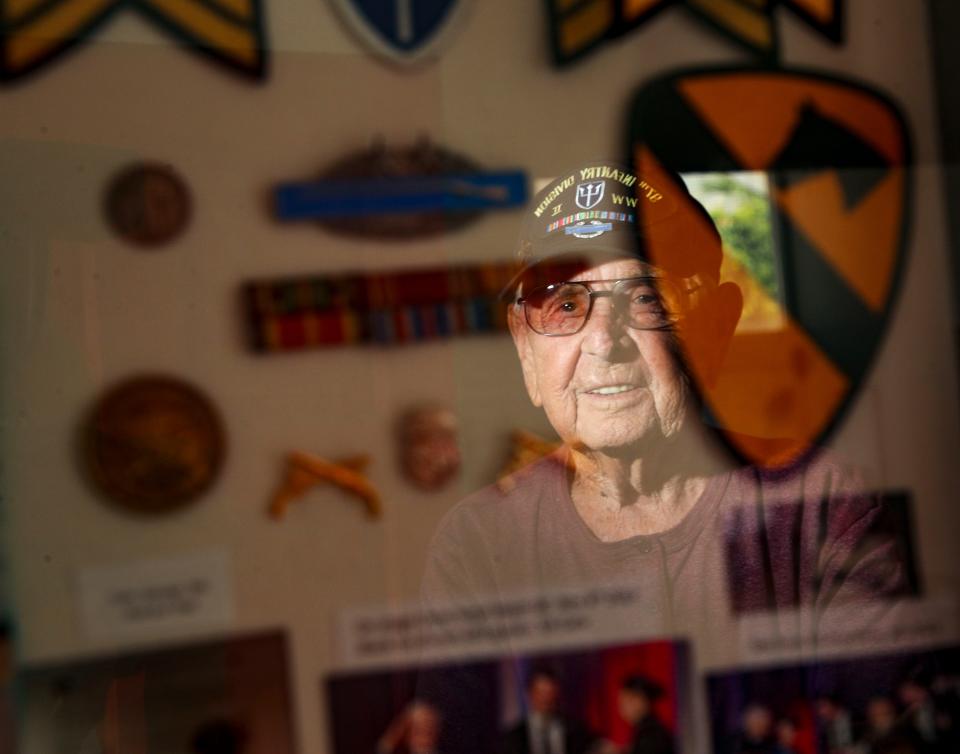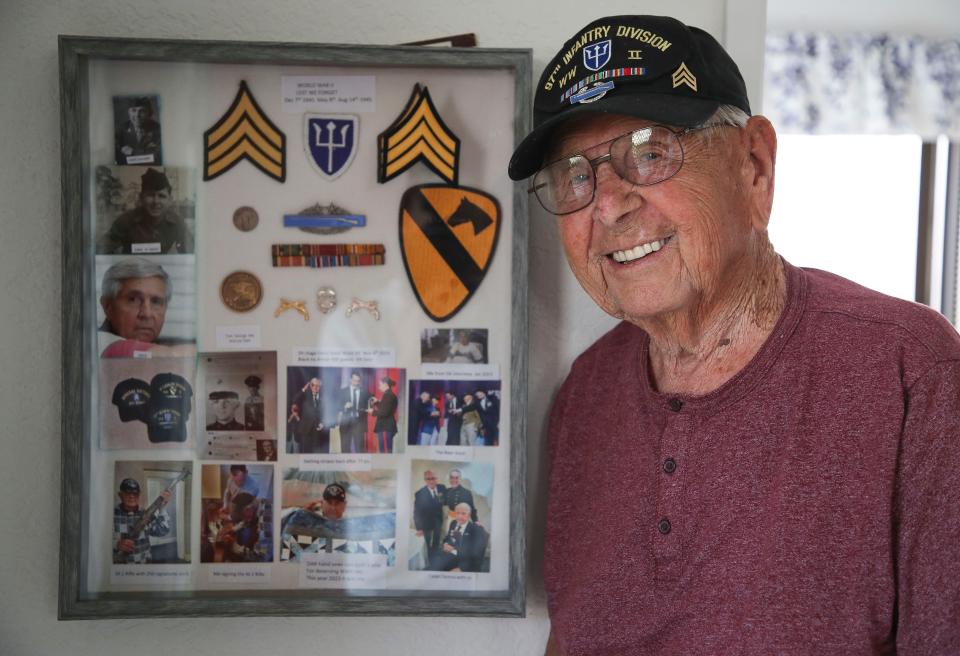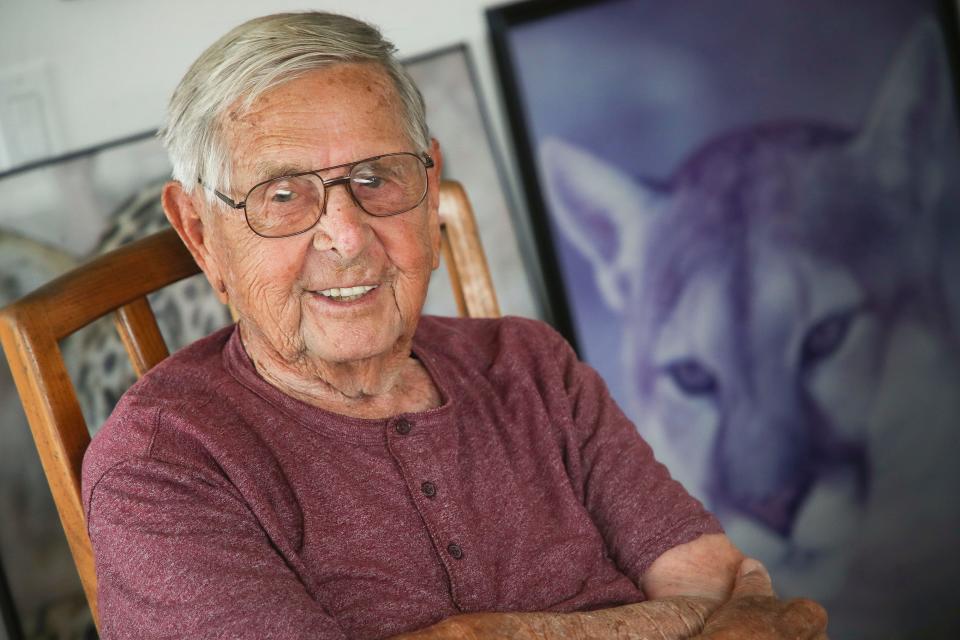‘Survival’: World War II veteran from Palm Springs shares story before return to Europe
Robert Shipe has many memories from his time spent in World War II — the tut-tut-tut of machine gun fire, the hard ground of a German forest serving as his bed, the Japanese beers that later got him in hot water — but asked what stuck with him most, he boiled it down to one word.
“Survival.”
Speaking recently at his Palm Springs home, Shipe recalled: “We had (enemy) sniper fire, not often and not repeatedly, they wouldn’t want to give their position away ... but we got kind of numb to that, because you wouldn’t hear them when they got you. As long as you were hearing them, you weren’t hit, so you didn’t worry about it.”
“Of course, if you try to run away, they shoot you, so you take your chances,” he added.
At 98 years old, Shipe is among the youngest of the remaining U.S. veterans to have fought in World War II, after joining the Army in early 1945 just after his high school graduation in Long Beach. He’s part of a shrinking group: Roughly 120,000 of the 16.4 million Americans who served in World War II — fewer than 1% — were alive as of 2023, according to U.S. Department of Veterans Affairs statistics.
Shipe will soon join some of his fellow veterans on an overseas trip to mark a major milestone: the 80th anniversary of the D-Day invasion in Normandy, France, which happened June 6, 1944. Sponsored by American Airlines, the trip will first take Shipe and about 70 veterans on a charter flight to Paris, before they head to the beaches where thousands of Allied troops were killed.
Both U.S. President Joe Biden and French President Emmanuel Macron are expected to give remarks.
While Shipe wasn’t yet in the military during D-Day, the trip will mark his first time in Europe since serving in the Army. He said it feels like “a repayment for my time in the war.”

For most of his life, his stories from the war went untold: Shipe said his kids “didn’t hear a word” about his service in World War II until he detailed his experience for a book published last year. Now, the stories are bubbling up — “lest we forget,” Shipe said.
“The younger kids don't know any more about World War II than I know about the Civil War and its history,” Shipe said. “They say you base the future on the past, and I’d like to see no more wars.”
George Shipe, Robert’s younger brother by 15 years, is joining his older sibling for the trip overseas. In an interview, he described Robert as “my hero in all regards,” noting he’s still “sharp as a tack” at 98.
“I don't think he really failed in anything in his life. Perhaps he did and didn't tell me, but ... you can’t hold the guy down,” George said. “The guy is steady as a rock in his life and his beliefs.”
45 days in battle: ‘Better to be lucky than good’
As he grew up in Long Beach, Shipe was always a good athlete, often playing sports with kids a year or two older than him. But that also meant many of his childhood friends were eligible for the draft well before Shipe turned 18. (The draft was initially limited to men who were 21 and above, but the age was lowered to 18 in 1942.)
“I was a pretty smart kid then ... but the second year when so many of them weren't coming back, my 17-year-old brain says, ‘Why should I do all this studying? Same thing is going to happen to me,’” Shipe said. “So I quit studying.”
Shipe graduated from high school in February 1945, and he joined the Army the next month. Shipe, who said he had “never been away from home a night in my life,” was soon training at a California base, preparing with the 97th Infantry Division for beach attacks in the Pacific Theatre.
But that changed when Nazi Germany surrounded Bastogne, Belgium, in the Battle of the Bulge, and Gen. Dwight D. Eisenhower sent some troops, including Shipe’s division, to Europe for the final months of the campaign. “You’re like a herd of cattle. You just do what you’re told,” Shipe said matter-of-factly about the change in course.

Shipe carried a Browning Automatic Rifle, or BAR, in combat, often having to lug bandoliers that held several magazines of ammunition. The weapon, which was heavier and stronger than the standard M1 rifle, also made BAR riflemen like Shipe into targets within their units.
Their tour took them across several countries, landing in France before moving through Holland, Belgium and Germany, with Nazi soldiers on the back foot at that point. The time in Europe also saw Shipe and his company transfer into the Third Army, and they marched into eastern Germany and Czechoslovakia, where they liberated thousands under Nazi rule.
The toughest fighting for Shipe’s unit came in the Ruhr region of west Germany from Siegburg to Düsseldorf, a hub area for aircrafts and ammunition that was defended vigorously by the Nazis.
“For 45 days, we had no clean clothes, no change of underwear, nothing hot in your stomach, a roof over our head (only) two nights, and we got shot at every day for $30 a month — minus $9 for insurance,” Shipe said with a small chuckle.
One day, moving through the Ruhr, Shipe and his company were traveling through a clearing in a forest, with five tanks leading the way through a big open area that made them “sitting ducks,” as Shipe recalled.
“(The Germans) knocked out all five tanks, and instead of waiting for a couple more, they sent us anyway,” Shipe said. “So we're going through all this open area, all spread out, and all of a sudden, machine gun fire starts. My next step would have been in a bomb crater, so I just dove in.”
Shipe said he stayed in the crater all day as the Germans held their line across the clearing — but the “young, brash 19-year-old,” as he put it, was eager to take a few shots from his position.
“Every time I showed my head this much, I got a little burst of machine gun fire around the buildup of the bomb crater,” Shipe recalled. “Just before dark, they brought up smoke grenades and filled the whole area with smoke. ... We took a real big hit that day, but better to be lucky than good.”
The battles in the Ruhr soon petered out, as Nazi Germany continued to wobble after retreating from France the prior year. Upon returning to Germany from Czechoslovakia, his unit learned from a runner that the war in Europe was over — an admittedly strange feeling for new soldiers like Shipe.
“I best describe it like, you're in a football game — you got 20 seconds to go, you're on the one-half yard line and you're behind four points,” Shipe said. “You need one last play to get through, and the gun goes off. The game's over. You want one more. But the next day it all sunk in, and we were very grateful.”
More: 'The world came to an end’: Six local Holocaust survivors share their harrowing stories
A beer bust on the Pacific
While Nazi Germany surrendered unconditionally in early May 1945, the war on the Pacific front was raging on — and relative newcomers like Shipe were headed over there soon after the victory in Europe.
After a brief break back home, his division trained at Fort Bragg, North Carolina, around the time President Harry S. Truman — “my best friend in the world,” Shipe quipped — dropped nuclear bombs in Hiroshima and Nagasaki, killing tens of thousands of people and leading to Japan’s surrender soon after in August 1945.
But Shipe’s division was still needed for post-war occupation duty, taking a ship to Japan in September 1945. Led by Gen. Douglas MacArthur, American troops stayed on the island until 1952. For Shipe, the voyage was a chance to experience a new culture and a new part of the world, without the unending threat of gunfire he felt in Europe.
“We had no difficulties,” Shipe said of the occupation time. “I never saw anything happened that shouldn't have happened in Japan. They were beaten and they accepted it. There were no riots or throwing things at us or anything.”
Instead, Shipe found himself in a different kind of trouble, when a friend in a different unit at their base asked if he had any beer at headquarters for his colleagues. Shipe authorized him to pick up some Japanese beer on base.
“That was the last I heard about it, until I got a call that the provost marshal wanted to see me,” Shipe recalled. “They had taken quite a bit of beer and got a little snockered on Friday. Saturday was a full colonel inspection over there, and they were still a little tipsy.”
Upon learning of Shipe’s role in getting the beer, high-ranking officers court-martialed the young soldier, who lost his corporal's stripes and dropped back down to a lower private rank.
The incident didn’t derail Shipe, who led a full career and lively retirement back in the U.S., but it led to redemption more than three-quarters of a century later at a black-tie event honoring World War II veterans in Washington, DC, last year.
After a video played in which Shipe discussed the court-martial, he was surprised with a gesture from the VA, which symbolically gave him back the stripes that he had lost — and even "promoted" him to sergeant.
“Then, they brought out four Budweisers — with the other three World War II veterans (on stage) — and we toasted each other with a beer,” Shipe said.
‘Becoming true brothers’
Shipe was discharged from the Army in April 1946, and he hasn’t returned to France — or anywhere in Europe — since fighting there over 75 years ago.
That will change in the coming weeks. While he didn’t fight in D-Day, having not yet turned 18, Shipe said his training included drills on landing boats, as they prepared for a potential invasion of Japan — which was expected to be worse than D-Day — that never came.
“I know how those poor guys felt (at D-Day). We had guys get seasick when the water was like the pool out here,” Shipe said, gesturing outside his condo. “I'm sure they were so sick that they couldn't wait to get off of those (landing crafts) when the ramp went down, just looking right into all that machine gun fire.”
Upon his return to Southern California, Shipe carved out a career as a magazine distributor and, later, as a pistol instructor for police departments and civilians across the western United States, while also pursuing a passion of driving sports cars.
Upon retiring at 55, he continued to pursue a couple other hobbies: photography and golf, which he continued playing until he was 96. His home is filled with pictures he's shot of wildlife — including some from The Living Desert Zoo and Gardens in Palm Desert — while his Army memorabilia hangs proudly next to his front door.

While Shipe long didn’t speak about his military service, even with his wife and kids, the recent ceremonies and interviews he’s participated in have strengthened his bond with family.
His younger brother, George, was only 3 when his brother left for the war. By the time Robert returned, he was fully in adulthood, and George said he was “kind of like a distant uncle.” That’s changed recently, as George also joined him for last year’s trip to DC, where they “really bonded and became close.”
“This trip coming up will be much longer,” George, 83, said. “He is a delight to be around, and I'm so looking forward to continuing our bonding process and becoming true brothers, rather than like a distant uncle and a distant nephew.”
George, who served in the military during the Cold War, also emphasized the importance of keeping stories like his brother’s alive for younger generations. The 83-year-old said he’s old enough to remember Civil War veterans who were still alive when he was young, and he sees a similar pattern today. U.S. Department of Veteran Affairs data projects fewer than 1,000 WWII veterans will be alive by 2035.
“We won't have these guys around much longer,” George said. “With this 80th celebration of the D-Day invasion, I will say that the next decade coming up — the 90th celebration — no one will be there from World War II, and so this is a particularly important moment. ... It’s history.”
Tom Coulter covers the cities of Palm Desert, La Quinta, Rancho Mirage and Indian Wells. Reach him at thomas.coulter@desertsun.com.
This article originally appeared on Palm Springs Desert Sun: World War II veteran from Palm Springs shares story before D-Day trip

